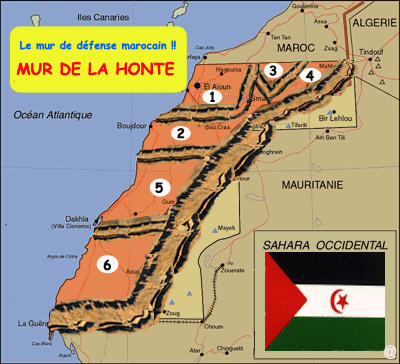
Their territory split by a huge wall built at enormous expense, an occupied Arab population suffers under police raids and arbitrary imprisonment while the occupiers try to swamp the territories with settlers from their own population. In response, the locals are beginning an intifada, but face a much larger, better-equipped military force, the beneficiary of substantial overseas aid. Refugees living in camps are refused the right to return to their homes.
Despite clear decisions of the International Court of Justice and the UN Security Council, the occupiers hedge whenever it comes down to the question of a peace settlement that grants independence even when American emissaries try to nudge them towards serious talks.
Welcome to Western Sahara, the occupation that admittedly has lasted only three decades compared with Israel's occupation of the West Bank and Gaza, but which has excited much less media interest.
The Moroccan one is superficially attractive after all these decades, offering Scottish-style devolution. But their track record on keeping promises is far from stellar. Over 15 years ago, Morocco accepted a peace deal that involved the referendum on self-determination. The cash-strapped UN has spent hundreds of millions on keeping a force there to monitor the cease-fire and arrange a vote. But as soon as it became clear that Morocco would lose any vote that involved independence, the king and his father before him, gave prevarication a bad name. They tried to stack the voters' rolls, and when that failed, simply refused to allow a vote that asked the question.
Morocco's human rights record leaves much to be desired, as indeed did Polisario's in the old days. But the Moroccan reticence about allowing a vote is eloquent testimony to the government's assessment of the popular mood.
What is the secret of Morocco's success? In essence, it is choosing friends carefully.
Morocco claims Arab solidarity - and is one of the best friends of Israel in the Arab World. Immediately after the Moroccans occupied the territory despite the ICJ ruling that rubbished its territorial claims, the UN security council passed resolutions 379 and 380, which explicitly and unconditionally called on Morocco to withdraw. However, the French and Americans blocked the enforcing of these resolutions. According to then-US ambassador to the United Nations Daniel Patrick Moynihan, "the Department of State desired that the United Nations prove utterly ineffective in whatever measures it undertook. The task was given to me, and I carried it forward with no inconsiderable success."
While the US's anti-communist fervour has died down - with communism - France has remained an important and unprincipled supporter of the king. Despite all that Cartesian rhetoric with which it opposed the invasion of Iraq, over the Sahara it has a novel and disturbing principle: the security council cannot impose its decisions on parties if they disagree.




 Reply With Quote
Reply With Quote


















 close to water!
close to water!









Bookmarks